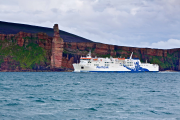Schneider Electric has announced a project to supply locally produced ‘green’ electrical power to the MV Hamnavoe NorthLink ferry while docked in Stromness, Orkney, due to get underway shortly.

The project is believed to be the first large commercial ship shore connection in the UK and is just one element of an overarching low carbon travel and transport project for the town.
This power supply system, known as ‘cold ironing’, will cut the current overnight carbon footprint from the vessel’s diesel generators and engines, lowering the MV Hamnavoe’s fuel consumption by at least 500 tonnes a year and resulting in a significant reduction in carbon dioxide (CO2). It will also make a contribution towards further reducing nitrogen oxides (NOx), sulphur oxides (SOx) and noise.
The ferry, which is a shipping lifeline for the island, connecting it with the rest of Scotland, will be £160,000 cheaper to service each year as a result of the project. The project is expected to fully pay for itself in three-years’ time, through efficiencies and cost savings.
The shoreside installation work is being carried out by Schneider Electric, and the project will see the installation of a cable connection system to the ship to provide overnight shore power, pier cables and a transformer upgrade – with the power coming through Orkney’s renewable energy resources.
The ‘Stromness Multi-modal Low Carbon Transport and Active Travel Hub’ project has three other elements:
- The installation of an electric bus charger at the ferry terminal to open up opportunities for an electric vehicle to be used on the Stromness to Kirkwall route
- The installation of electric vehicle charging points for ferry users as well as all other EV owners
- The procurement of electric bicycles for use by members of the public, plus associated shelters and charging facilities


